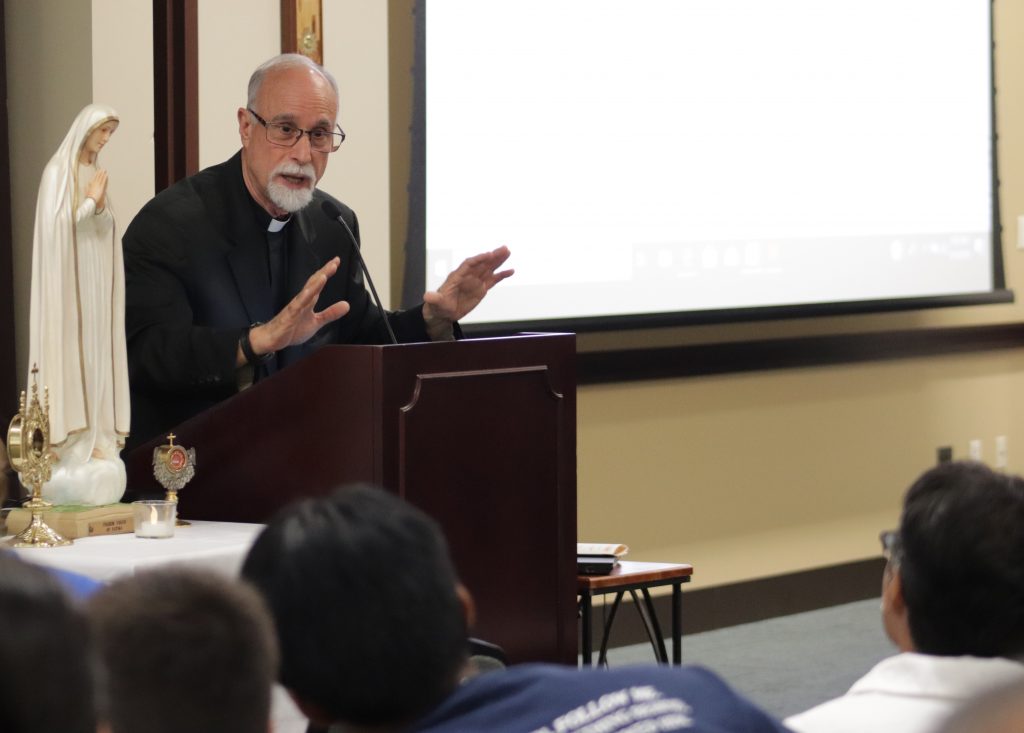Respect Life Conference: End of life issues becoming more prevalent, complicated

Father Alfred Cioffi responds to a question from Loreto Xavier of Bloomington during his session on end-of-life issues at the Diocese of Peoria's Respect Life Conference on Sept. 14. On a stand next to the speakers were relics of St. Catherine of Siena (left) and Pope St. John Paul II, patrons for the conference. (The Catholic Post/Jennifer Willems)
Saying everyone will face decisions about care at the end of life sooner or later — if not for themselves, then for someone they love — Father Alfred Cioffi started a conversation about some of those issues with participants at the Respect Life Conference on Sept. 14.
The beginning of life is known and occurs at fertilization, said Father Cioffi, a priest of the Archdiocese of Miami, Florida, and associate professor of biology and bioethics at St. Thomas University in Miami.
But with men living until about 78 and women living until about 81, end-of-life issues are becoming more and more prevalent and complicated, he said.
Identifying the vital organs of the body, Father Cioffi said if one of them is dying irreversibly, the death process has begun.
“We should never kill anyone, but we may allow people to die,” he explained. “If we don’t allow people to die, it is a serious thing.”
“We should never kill anyone, but we may allow people to die. If we don’t allow people to die, it is a serious thing.” Father Alfred Cioffi
To guide medical professionals and decision makers, the U.S. bishops have developed the “Ethical and Religious Directives for Catholic Health Care Services,” which contains the church’s teaching on life and health care, Father Cioffi told conference participants. The sixth edition was published in 2018.
According to the document, “a person has a moral obligation to use ordinary or proportionate means of preserving his or her life,” but may forgo “extraordinary or disproportionate means of preserving life.” It defines disproportionate means as those that “in the patient’s judgment do not offer a reasonable hope of benefit or entail an excessive burden, or impose excessive expense on the family or the community.”
Father Cioffi explained that it is permissible to assist vital organs, but there is no moral obligation to substitute them. That’s not sustainable, since all of those organs will fail eventually, he said.
Nutrition and hydration has become a touchy issue over the years, but there is a presumption in favor of it as an ordinary means of life support. Father Cioffi cautioned that there are always exceptions and informed decisions must be made on a case-by-case basis.
“When there is no more cure — medicine does have its limits — then care always obligates,” he said, noting that in addition to food, water and shelter, human beings require contact and interaction.
“We are substantially social beings,” he said. “We should never be deprived of human interaction, even if that person is in a coma or persistent vegetative state.”
Father Cioffi urged conference participants to think now about how they want to be treated — or not treated — at the end of their lives, saying, “If we don’t decide, believe me, someone else will decide for us and they may not decide on our behalf.”
He referred people to “Encouraging End of Life Conversations: A Catholic Perspective on Advance Directives,” which was published by the Catholic Conference of Illinois in 2016. It may be downloaded for free at ilcatholic.org/multimedia/publications.





